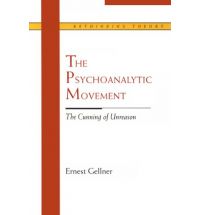The Psychoanalytic Movement
by Ernest Gellner
Review By Dan Geddes
18 September 1999
The Psychoanalytic Movement tries to answer the question: how did Freudianism come to achieve such a solid foothold in the intellectual life of the West, especially in light of the fact that Freudianism has such little scientific basis?
Gellner is sarcastically dismissive of the claims of psychoanalysis, but backs up his claims with a wealth of insight and argument. His premise is that no movement should be studied strictly on its own terms, that a movement’s claims should be verifiable against external societal criteria. Given this premise, it is not surprising that psychoanalysis appears an untenable theory; any religious system would also fail testability tests—but this is precisely Gellner’s point about psychoanalysis. Its conceptual system betrays many of the same strategies as religions for gaining and retaining adherents.
Gellner argues that religions present their claims in such a way that individual must wager one way or another on their claims. Freudianism does something of the same: because it implicitly claims such a mammoth importance of the power of the unconscious, and because it implicitly claims to have a unique method of divining the unconscious, the individual ignores the claims of psychoanalysis at his own peril. The unconscious itself is the most powerful “joker” in the deck, because is it held to be protean, supremely cunning, and fully knowledgeable about the workings of its enemy—the conscious mind. And even though Gellner feels that it is a weakness of the Freudian theory of the unconscious that it bears so many similarities to the conscious, the unconscious can contradict itself endlessly, making it all the more murky to discern (and thus making the psychoanalysts all the more important).
My favorite part of the book was the early chapters wherein Gellner treats the intellectual backdrop that made Freudianism possible, and so appealing. The late nineteenth century was a time when man began to see himself again as a part of nature, instead of as the “angel/beast” he was during the Christian centuries. Unfortunately the picture of man created by Western Philosophers was so colorless and unappealing that it could not gain any mass acceptance as an accurate picture of man. The reliance on empiricism led to the belief that man himself was a mere “Bundleman” (as Gellner hilariously depicts it) a passive recipient of sense-data, which in turn determined his actions, even his reason and thought (and was thus a powerful precedent of behaviorism). (Gellner also points out that the Bundleman theory dovetailed nicely with Enlightenment political philosophy, which postulated systems of government based on dissent).
Although many philosophers realized the inadequacy of the Bundleman theory, Nietzsche made the most powerful critique of it. In fact, for Gellner, Nietzsche appears to be the single most important antecedent for Freud. Nietzsche postulated a body of ideas (which Gellner calls the Nietzschean Minimum), which itself was far too unsavory for mass consumption, but which Freud successfully repackaged for mass consumption. Freud’s prestige as a doctor, his propensity for founding a school, his stress on sexuality over the menacing Will to Power, all contributed to make Freudianism far more palatable to the Western middle-classes as a whole, while Nietzscheanism remained more the province of artists and intellectuals.
Freudianism could only thrive only in relatively affluent societies that had managed to solve the problems of securing food, clothing, shelter, and youthful death. Freudianism requires a bourgeois class able to afford the time and money for analysis. It is fitting that in modern societies the primary fears are not that of death or disease but of other people. This is what psychoanalysis is best equipped to deal with. Modern man has no set role and must deal with what Gellner calls “the anxiety of continuous assessment.” This is the natural corollary of a society that is ostensibly a meritocracy.
Gellner also engages in an extensive critique of psychoanalysis as an institution. It is curious that in the early days, that all credentials emanated from Freud himself. Unlike in other professions, where there are Board examinations, psychoanalysis in the early days required no such authorization (much of the authority probably coming Freud’s standing as a doctor; Nietzsche a mere professor, could not have founded such a movement). In fact the most important criterion for becoming an analyst seems to be to have been analyzed yourself by another psychoanalyst.
Central to psychoanalysis is the patient/analyst relationship. Significantly, psychoanalysis doesn’t seem to allow for an unsuccessful treatment; lack of success is attributed to the patient’s resistance rather than any failure of the therapist. Transference is also natural in a relationship where one has such power of the other.
Chief among the many theoretical weaknesses of psychoanalysis is its adherence to “naïve realism”—that an unobstructed mind can easily discern reality. In psychoanalysis, it is the therapist’s job to remove the obstruction from the patient’s eye. (Gellner argues that it takes a large body of knowledge and preconceptions in order to acquire further knowledge.) Since, for psychoanalysts, “lifting the veil” is the path to knowledge, it stands that enemies of the movement have not had their veils lifted—this leads to ad hominem arguments.
Even more central to psychoanalysis is the theory of the unconscious, which Gellner states serves the movement as a kind of untrumpable Joker, much as the removal of God’s mind from man serves in religion. Gellner claims to believe in some sort of unconscious, and lists other phenomenon that he feels rightfully belong to the realm of the unconscious. Also, Freudianism utilizes “pseudo-psycho-hydraulics”—metaphorical drives, forces, blockages that balance each other, rather than more scientific and crisply defined terms.
Freudianism answered a specific need at a specific time—even in the realm of morality. Again, as Nietzsche had observed, the old morality was dead, and yet what had come to take its place? In the place of the Christian notions of good and evil we have began speaking in Freudian terms of “adjustment” and “maladjustment”—highly subjective terms that allows the analyst to dole out final judgement as to whether the patient is cured. Freudianism can never have taken root in societies where both metaphysical notions of reality and moral codes are absolute and unquestionable. It needed the rootlessness of the late 19th century West.
Gellner also makes offers some interesting insight into the close relationship between Freudianism and Platonism.
I thoroughly enjoyed this book. I can see how many would decry Gellner’s style as “unacademic” or something because of his willingness to humorously characterize ideas in comical terms like “Bundleman” or “NM”. This work could have been filled more with devastating evidence of the statistical failure of psychoanalysis. Instead, it is more interested in the intellectual debate—why psychoanalysis is untestable, and so capable of resisting criticisms and infecting the public discourse.






Be First to Comment